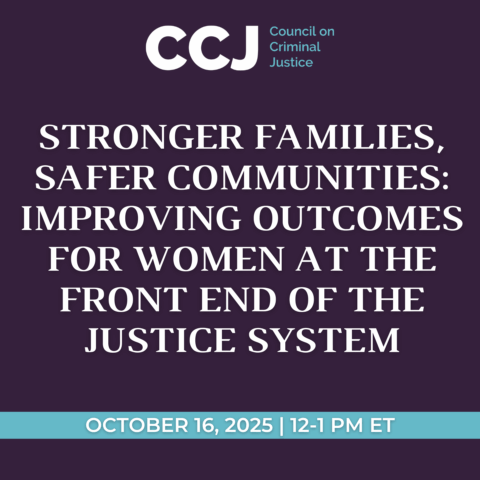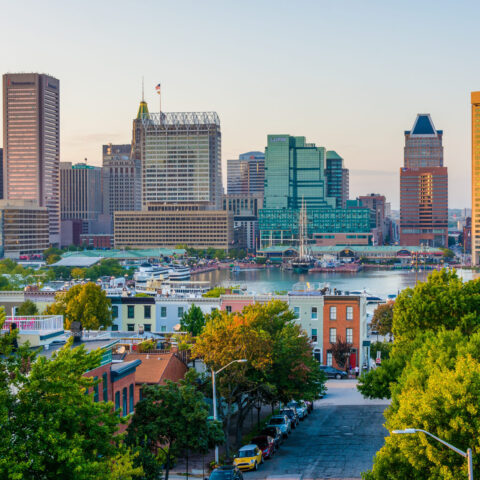Council Perspectives
CCJ Staff Perspectives
Senior Fellow Chair, Violent Crime Working Group
As I noted in Police Chief magazine, police violence leads to community violence. Tragically, homicide and shooting rates are likely to rise in #Memphis. Police will make mistakes – they are human – but flagrant abuses of power must cease. These incidents are simply too damaging. pic.twitter.com/HFeyhTGVGx
— Thomas Abt (@Abt_Thomas) January 31, 2023
CCJ Senior Fellow; Co-Author, Justice System Disparities: Black-White National Imprisonment Trends, 2000 to 2020
If We Want to Reduce Deaths at Hands of Police, We Need to Reduce Traffic Stops,TIME
“Less than 2 thousandths of a percent—or less than 1 in every 45,000—of police-citizen encounters end with a citizen fatality. But when a citizen does die, a Black American is twice as likely as a white person to be the victim.
Tyre Nichols’ alleged murder is the latest in a spate of seemingly avoidable high-profile police killings of Black men in the U.S. Some blame these incidents on a few ‘bad apples.’ Others contend these tragedies reflect a system riddled with institutional and cultural failures imbued in broader systemic inequities.
For us as Black Americans and scholars of criminal justice, Nichols’ all-too-familiar-demise again shows how race and pretextual policing intersect at fatal police encounters.”
CCJ Senior Adviser Director, Corporate Partnerships
What I saw on that video was graphic & brutal, but not surprising or foreign.
— Glenn Martin (@glennEmartin) January 28, 2023
CCJ Member Perspectives
Professor, Yale Law School
Tyre Nichols Beating Opens a Complex Conversation on Race and Policing, The New York Times
“Blackness doesn’t shield you from all of the forces that make police violence possible. What are the theories of policing and styles of policing, the training that police receive? All of those dynamics that propel violence and brutality are more powerful than the race of the officer.”
Vice President of Criminal Justice, Arnold Ventures
Demanding Accountability After the Killing of Tyre Nichols, Arnold Ventures
“Last weekend in Memphis, five police officers were indicted for second-degree murder of 29-year-old Tyre Nichols after they escalated a traffic stop into a ’disregard of basic human rights’ — to quote Memphis Police Chief Cerelyn Davis. Two additional police officers have been taken off duty, and three fire department employees have been fired for their actions related to Nichols’ death.
Chief Davis has emphasized the importance of reforms to prevent this kind of loss of life — de-escalation training, front-end evaluations to ensure that departments hire the right people, and officers’ duty to exercise care and regard in all situations.
Responsibility falls on law enforcement leaders like Chief Davis to implement reforms that are known to work and be selective about who earns the privilege to wear a badge.”
Professor from Practice, Georgetown Law
What Tyre Nichols’ death at the hands of Black officers says about race in policing, Los Angeles Times
“The cycle of police violence and protest in America has so often been told as a story of white officers killing Black men that three words — ‘Black lives matter’ — stand as global shorthand.
But the death of Tyre Nichols has challenged the narrative.
The 29-year-old FedEx worker — who died after police in Memphis, Tenn., pulled him over, used a Taser and pepper spray on him and severely beat him — was a Black man. So are the five police officers charged with murdering him.”
Cities should get rid of their toxic crime-suppression units, The Washington Post
“Last week, after five Memphis police officers were charged with murdering their son, Tyre Nichols’s family called for the dissolution of Scorpion, the specialized policing unit to which those officers were assigned. On Saturday, Memphis made the right decision and announced it would shut the unit down.
Now, other cities should follow Memphis’s lead and disband their own analogous — and outdated — units.
In my decades investigating law enforcement agencies, and studying what makes them prone to causing unnecessary harm, I have consistently found that units such as Scorpion are a key factor. And they are not unusual. Most mid-size to large cities have a unit — or several — akin to Scorpion, focused on areas considered to be crime ‘hot spots’ or on a particular task such as seizing drugs or guns.”
Senior Advisor for Public Safety, NYU School of Law Policing Project Former Police Chief, Richmond (CA) and Tucson (AZ)
When City officials panic about crime—how it will impact them politically or in response to complaints they receive from residents, their support for units like “Scorpion” in Memphis should be no surprise,
— Chris Magnus (@CMAGNUS20011) February 4, 2023
Sheriff (ret.), Los Angeles County Sheriff’s Department
Former Sheriff Jim McDonnell comments on footage of Tyre Nichols incident, CBS News Los Angeles
Co-Founder, Campaign Zero
Former Sheriff, King County (WA) and Board Member, National Policing Institute
The Myth Propelling America’s Violent Police Culture, The Atlantic
“Some 25 years ago, I remember sitting on the Shooting Review Board for the King County Sheriff’s Office, a large metropolitan police department serving the Seattle region. I recall listening to an investigator explain the chain of events that had led to the fatal shooting of a man fleeing the scene of an armed robbery. My memory is that the man had a long criminal record and had just committed another felony. Not a sympathetic figure to me or the public, but still a human being.
The presentation we heard contained evidence that the responding officers’ tactics had created the conditions that made the shooting necessary, to ensure their own safety. (The term of art is ‘officer-created jeopardy.’) But the review process had been negotiated with the police union and by design had remained out of the public’s view and tightly focused on the moment the officers had fired their weapons.”
Former Police Chief and Commissioner, Washington, DC, Philadelphia, and Chicago Member, CCJ Board of Trustees
*Note: this link shows the video footage, which begins playing immediately upon visiting the webpage.
“The pole cam video is the one that really justifies the charges. Nobody trains for that. These guys are acting so far outside of bounds that … you really can’t explain it.”
Former Chief of Police in Nashville and New Orleans Professor of Practice, Loyola University New Orleans
Amid soaring crime, Memphis cops lowered the bar for hiring, The Associated Press
“If you lower standards, you can predict that you’re going to have problems because we’re recruiting from the human race. There’s such a small number of people who want to do this and an infinitesimally smaller number of people we actually want doing this.”
Distinguished Professor of the Practice of Law, University of Alabama School of Law
Why the DOJ’s response to Tyre Nichols’ brutal killing matters, MSNBC
“On Thursday, Shelby County District Attorney Steve Mulroy announced that the grand jury had indicted five former Memphis police officers in the death of Tyre Nichols, who died three days after he was severely beaten during a traffic stop. The charges include second-degree murder, aggravated assault and aggravated kidnapping. Nichols died Jan. 10. The indictment came surprisingly quickly.
Or, perhaps, not. Because the beating, which resulted in the prompt firing of all the officers involved, was captured on body camera footage. Preliminary findings from an autopsy released by the Nichols family show the 29-year-old suffered ‘extensive bleeding caused by a severe beating’ before his death. Contemplating what the officers must have done to cause such serious injury is shocking and appalling.”




